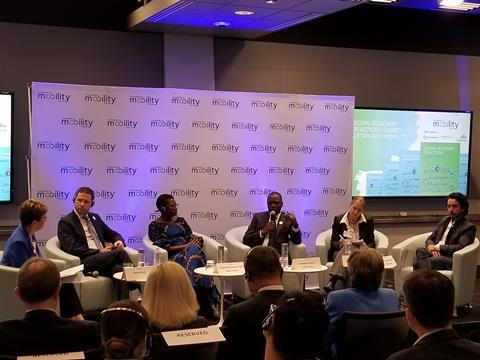
INTERNATIONAL: The Sustainable Mobility for All group of 55 organisations published its Global Roadmap of Action toward Sustainable Mobility report on October 23. The launch event took place at the headquarters of the World Bank, a SuM4All member, in Washington DC.
The report aims to help national and city governments to attain sustainable development goals and improve the sustainability of local transport. It does this by identifying the most effective policy measures that governments could take.
The report defines four characteristics of sustainable mobility: universal access, efficiency, safety and green mobility. It stresses that the path to achieving these goals will be different for each country.
‘Transport is central to our lives, and it is a key sector in solving the climate crisis and the broader development challenges that the world faces’, SuM4All Practice Manager Nancy Vandycke told Metro Report International. She added that policy reforms and can often make a bigger difference than infrastructure investment to achieving sustainable mobility.
Regional variations
The report assesses the performance of 183 countries in meeting each of the four targets, and identifies 182 policy measures that can advance progress. It also includes a methodology to implement the most relevant and effective measures for each country.
SuM4All notes that its Global Mobility Report published in 2017 found that no country has achieved sustainable mobility. The current work aims to answer the question of how to move towards the goals.
Developed countries outperform developing countries on all goals except greenhouse gas emissions per capita. Europe and Central Asia perform on average better in the universal access category, whereas Sub-Saharan Africa performs worst on this measure, as well as on efficiency and safety. South Asia, in turn, has the worst air pollution.
Taking all four measures together, Germany is ranked as the best country for sustainable mobility, followed by the Netherlands, Sweden, the UK and France. The only non-European country in the top 10 is Japan, in seventh place. The worst-performing country is Libya, followed by the Central African Republic and Yemen.
Urban transport
Among the city leaders speaking at the launch ceremony, Mayor of Freetown Yvonne Aki-Sawyerr described sustainable mobility as part of a holistic approach to sustainable urban development, explaining that transport can help with other development goals by providing access to healthcare and education.
Former mayor of Quito Mauricio Rodas stressed the importance of access to financing for urban authorities, as measures taken by cities are a necessary condition for countries to meet their sustainability goals.
SuM4All estimates that an additional 380 million people would have access to sustainable transport if rapid transit networks were introduced in cities of at least 1 million people that currently lack them.
